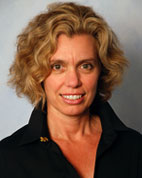
Professor and Chair, Department of Pharmacology & Physiology
Read her profile
What brought you to Drexel?
Biomedical research brought me to the U.S. when I was in medical school. After training at the NIH, the University of Virginia and the University of Chicago, I was offered a tenure-track faculty position at Drexel University College of Medicine. At the time, I did not know much about the school, but I liked the tangible opportunities for growth (both at the personal and institutional level), the leadership's vision (i.e., to expand and strengthen Drexel's presence locally, nationally, and internationally), and the legacy of the Woman's Medical College of Pennsylvania (attention to women's health needs, their place in society and presence in the leadership); these, along with the enthusiasm of some of the people I work with, are all factors that kept me here!
What is your current research of clinical interest or administrative interest?
Research in my lab primarily focuses on the neurological complications of HIV infection (collectively known as HAND), with a specific interest in the molecular and cellular basis of the disease and the interplay of HAND with drug abuse. Our recent discoveries involving regulation of chemokine receptors - a class of membrane proteins essential to various physiological and pathological functions - have identified a number of neuroprotective pathways that can be exploited for therapeutic purposes. In addition, I am also interested in what role these receptors have in relation to cancer, a project that stems from my long-lasting collaboration with my husband (also a faculty member at DUCOM).
I have been actively involved in institutional activities that aim to foster clinical and translational research at Drexel, which culminated with the creation of the Clinical and Translational Research Institute (CTRI). The main goal of the CTRI was to establish and support the physical and intellectual infrastructure necessary to transform scientific discoveries into valuable medical applications. This involved a multifaceted strategy, including establishment of core technologies, seed funding streams for translational research, and opportunities for physicians to engage in research – among others.
Is there a professional or personal accomplishment which you would like to share?
I am very proud of all my research and academic achievements so far, but there is still so much to accomplish that it is too early for sharing. However, when it comes to professional satisfaction, the accomplishments I value the most are usually related to my students. There is nothing more rewarding to me than being part of their learning experience and witnessing the metamorphosis that invariably occurs, albeit in very different ways. On a personal level, I am proud of my general lifestyle. By giving enough attention to all the domains that are important to me (work, family, self and community) I feel accomplished and able to contribute. To me, balance is essential.
Is there something outside of work that inspires you or about which you are passionate?
I am inspired by PROGRESS (in the real sense of the word, i.e., positive development, improvement, advancement). Hence, I am passionate about the learning process. There is something magical in being able to complete a task using recently acquired tools and resources. Additionally, I particularly enjoy activities involving the act of giving and creating. These may include mundane actions like cooking an everyday meal, or any artistic endeavors, as well as more pressing issues, such as identifying innovative ways to solve an unmet health problem, helping a colleague/friend in need, or resolving a crisis. However, I do not make a distinction between in/outside of work. It is all part of my life.
What advice would you give to your younger self?
The same one I was given by my parents and was fortunate enough to put into practice: choose a profession you enjoy and that makes you happy. However, I would also advise my younger self to pay attention to aspects of the career path that are important but not necessarily second nature to all, such as self-promotion and networking. I would also remind my younger self to savor the process as much as the result and take the time to celebrate achievements, which I rarely do.
Do you have current mentees? Graduate students, post-doctoral students, medical students, residents or fellows?
I have always had mentees in the lab, including medical, graduate and undergraduate students, and postdoctoral fellows, and I like when the group is diverse. Currently, there are two PhD students, two master's students, a medical student candidate, one undergraduate student, and one postdoctoral fellow. They are different in every way (background, skills, personality, goals and expectations) and yet work very well as a group and in perfect harmony.